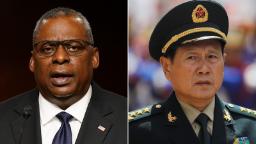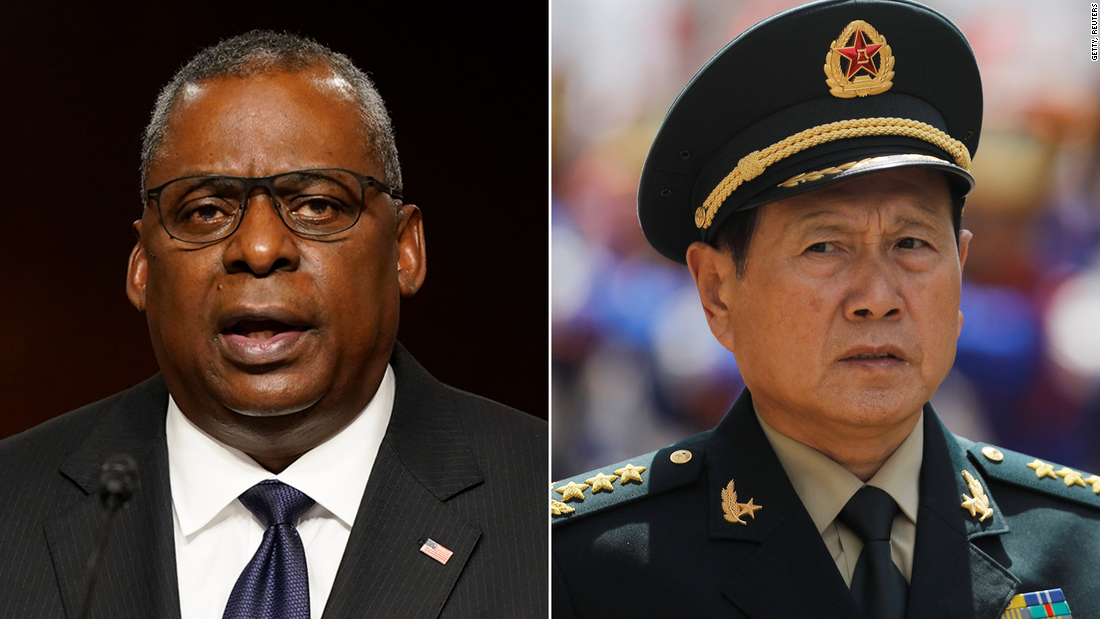US and Chinese defense chiefs trade barbs over Taiwan at first face-to-face meeting

The US is committed to its One China policy, Defense Secretary Lloyd Austin told his Chinese counterpart, Gen. Wei Fenghe, but he warned that the Chinese military has become increasingly aggressive, unsafe, and unprofessional in the region, a US defense official said after the meeting at the Shangri-La Dialogue.
The US official said the actions by the People’s Liberation Army (PLA) reflect recent statements made by Chinese officials that suggest Beijing may be altering the status quo regarding Taiwan, a democratically controlled island that China claims as its sovereign territory.
“Secretary Austin also raised concerns about … statements by PLA officials that the Taiwan Strait is not international waters. [People’s Republic of China] officials have said that multiple times to the United States over the last several months and that’s deeply concerning,” the official said.
Reacting specifically to the US statements in a post-meeting briefing, a Chinese military spokesman said it wasn’t Beijing that was upsetting a decades-long policy that has provided stability across the Taiwan Strait.
“It is not the mainland that is changing the status quo, it is Taiwan independence forces … and outside forces that are trying to change the status quo,” Senior Col. Wu Qian said at a news conference after the meeting.
A Chinese statement on the meeting said Wei pointed specifically to a recently announced $120 million US arms sale to the island. The new arms sale will cover “spare parts for naval ships and related technical assistance,” Taiwan’s Defense Ministry said on Thursday.
“The US again announced arms sales to Taiwan, which has seriously undermined China’s sovereignty and security interests. China firmly opposes this and strongly condemns it,” the Chinese statement said.
The issue of Taiwan took up the bulk of the meeting between Austin and Wei, the US official said.
Ukraine
Russia’s war against Ukraine also proved to be a contentious issue.
Austin urged his Chinese counterpart not to provide any material support to Russia, the US official said.
In China’s post meeting press conference, Wu stressed China had not done so.
“China did not provide military assistance to Russia. That is for sure,” Wu said.
Despite those differences, Wu described the meeting, which last nearly an hour, almost twice as long as planned, as having “good effect.”
It was “candid’ but “positive and constructive,” he said.
The two also talked about the US desire to establish more robust lines of communication between the two militaries to avoid competition between two world powers turning into conflict. The official said Minister Wei was responsive to the idea of establishing crisis communications mechanisms, suggesting there may be more concrete outcomes on these mechanisms later this year.
“I would anticipate that there would be additional open channels, including military-to-military channels, whether it’s from INDOPACOM or the Chairman [of the Joint Chiefs]. I think both sides are likely open to that in the coming months,” the official said.
Before the meeting, a US defense official said Washington would try to establish lines of communication at the highest levels of the militaries as a mechanism to avoid situations that would result in conflict between the two Pacific powers. The US also wants to see communication mechanisms between commanders at the theater level, officials said.
“This has been a priority for us in the defense relationship,” the official said.
Wu, the Chinese spokesperson, said next steps in the US-China relationship will include conducting exchanges and talks on cooperation through both military and diplomatic channels.
“The Chinese side thinks it is better to meet than not to meet and it is better to talks than not to talk,” he said.
CNN’s Eric Cheung contributed to this report.
For all the latest world News Click Here

